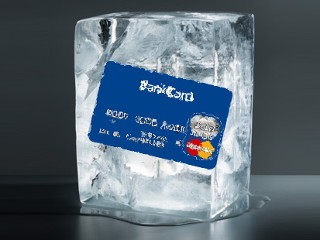Final Steps
Step 6 - Eliminate bad debt.
You've probably heard the phrase "good debt" and "bad debt". Good debt makes you money over the long term whereas bad debt does the opposite. Eliminating bad debt is one of the most important things you can do to fast-track your financial future. According to Finder in 2022 there were over 13 million credit cards in Australia netting a national debt accruing interest of $18.5 billion dollars.

You've probably also heard the term "frozen assets". We're going to coin an opposite term "frozen debt" in order to assist you with getting creative with managing your credit cards. Place all your credit cards into a plastic container and literally put it in the freezer. If you absolutely must use your credit card for emergencies then it's there, but you have to take it out of the freezer long enough for the ice to melt before you can use them. Credit card debt is so easy to fall into and they have some of the highest interest rates of all consumer debts. Furthermore owning credit cards impedes your borrowing capacity when it comes to investing in property, so there aren't enough good reasons to keep a credit card even with rewards programmes.
Fastest debt first
The goal is to focus on improving your monthly profit and loss to enable you with more funds to invest. As such, rank your debts as to which ones you can focus on paying off the quickest. Consider a $2,000 personal loan and a $40,000 car loan. You may be paying $200 a month on a loan that has $2,000 remaining, but it will continue costing you $200 a month until this debt is finalised. By concentrating on eliminating the $2,000 debt, you have immediately added an extra $200 a month to your income. If, instead, you were focusing on paying off a $40,000 car loan as the most important debt to eliminate, this will take you significantly longer and yet the monthly repayment amounts will remain the same. Focus all your surplus funds to pay off your debts one by one, concentrating on the quickest debt to repay first.
Downsizing
It may be the hard truth, but sometimes we are simply overcomitted and our lifestyle choices impair our ability to progress financially. If you've been unable to purchase a house, consider the amount you're paying in rent. Rent is dead money so the less you spend the better. There are tax advantages to renting versus owning so, for some, renting makes sense. It allows you to focus on investing in income generating assets whilst being able to claim the costs associated with doing so off your personal income tax such as interest charges, body corporate fees, rates, utilities, depreciation and more. These tax savings can then be used to further fuel your investments. Owning a property can cost more than renting in terms of directly affecting your cash flow, which may affect your ability to save and invest. In other words renting is not the worst option as long as you're not paying too much.
If you own a house, how much are you paying in mortgage repayments? If your monthly mortgage repayment is seen as a burden which is preventing you from having excess funds to invest, it may be worth consdering a property that is less of a financial drain. You can always upgrade your home when the time is right when you have additional surplus from your investment income. The idea with owning your own home is owning it as soon as possible and updating it when it's comfortable to do so.
Is your vehicle costing you money in repayments every month? In as much as owning the car of our dreams can bring us happiness, it can also be a source of financial stress and can impact your finances for the rest of your life. Cars can depreciate from 8% to 14% per year which is a considerable amount of money to part with. Consider a vehicle that costs $50,000 to purchase. Assuming a 10% depreciation each year, that's $5,000 that your vehicle has cost you in only one year. In five years, your vehicle may have depreciated a whopping $25,000. However a second hand vehicle that has a purchase cost of $10,000 will depreciate only $1,000 if at 10% deprecation, or even less. Both vehicles will get you reliably from A to B yet one will leave you with more money to invest. If owning a $50,000 vehicle is important to you, then there's nothing stopping you. You are making decisions and balancing what is more important to you and your happiness.